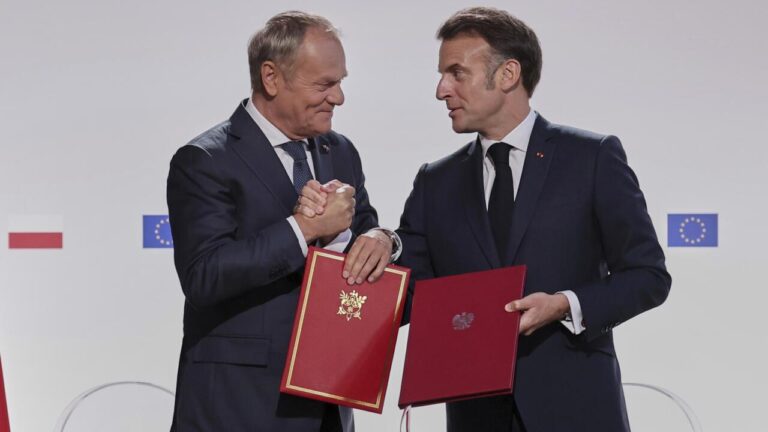In a significant step towards bolstering European security, France and Poland have formalized their commitment to mutual defense through a new cooperation treaty. The agreement, which aims to enhance military collaboration and strategic partnership, comes amid rising geopolitical tensions in the region. Leaders from both countries expressed their resolve to work closely together, reinforcing a united front in addressing security challenges. This treaty is poised to pave the way for deeper integration between the two NATO allies, bolstering not just their own defenses but also contributing to the overall stability of Europe. As global security dynamics evolve, this pact underscores the importance of transnational alliances in safeguarding national interests and ensuring regional peace.
Understanding the France-Poland Defence Pact and Its Strategic Implications
The recent defence pact between France and Poland marks a significant shift in the geopolitical landscape of Europe, fostering closer military ties amid rising tensions in the region. This treaty not only reinforces their mutual commitment to safeguard sovereignty but also highlights the importance of strategic partnerships in addressing emerging threats. Key elements of the agreement include:
- Joint military exercises and training programs
- Increased intelligence sharing and strategic planning
- Collaboration on advanced military technology
One of the standout implications of this pact is its potential to deter aggressors while enhancing NATO’s collective defense posture. With both nations recognizing the evolving security challenges posed by external actors, such as aggressive maneuvers from Russia, they are poised to play a pivotal role in European stability. Notable strategic benefits involve:
- Strengthening Eastern European defense capabilities
- Reinforcing the commitment to NATO’s Article 5
- Bolstering transatlantic relations with the USA
Key Areas of Cooperation in the Treaty and Their Impact on European Security
The recent treaty between France and Poland establishes several crucial areas of cooperation, which are set to significantly bolster European security. Among the most pivotal aspects are:
- Military Collaboration: Joint training exercises and operations designed to enhance interoperability between French and Polish armed forces.
- Intelligence Sharing: Enhanced mechanisms for sharing intelligence concerning threats to regional stability.
- Cybersecurity Initiatives: Coordinated efforts to defend against cyber threats, acknowledging the technological dimension of modern warfare.
This treaty not only solidifies the bilateral ties between France and Poland, but it also sends a strong signal to other EU member states regarding collective security commitments. Given the growing geopolitical tensions in Europe, these collaborative frameworks aim to create a more cohesive defense posture, potentially reshaping the security landscape across the continent. An analysis table reflecting key expected outcomes of this partnership is as follows:
| Outcome | Description |
|---|---|
| Enhanced Readiness | Increased military preparedness through joint exercises. |
| Improved Defense Capabilities | Upgraded technology and resources through shared developments. |
| Strategic Stability | Strengthening deterrence against external threats. |
Recommendations for Effective Implementation of the Mutual Defence Agreement
To ensure the success of the newly established mutual defence agreement between France and Poland, several key strategies should be implemented. Regular joint military exercises will not only enhance the operational readiness of both armed forces but also foster stronger inter-military relationships. Establishing a dedicated communication channel for rapid decision-making can significantly improve coordination in times of crisis. Furthermore, the integration of defence technologies should be prioritized, with both nations investing in R&D to innovate solutions tailored to their unique strategic needs.
In addition to military collaboration, addressing the social and diplomatic dimensions of this agreement is crucial. Engaging in educational exchanges for military personnel can cultivate a deeper understanding of each country’s culture and operational philosophy. Moreover, building public awareness campaigns can help demystify the agreement’s purpose and benefits, garnering broader support among citizens. To facilitate ongoing evaluation, both nations should establish a joint oversight committee to assess the effectiveness of the agreement and recommend adjustments as necessary.
Analyzing Regional Reactions and the Future of NATO Alliances
The recent cooperation treaty between France and Poland signifies a pivotal moment in European defense strategy, enhancing mutual assurance against common threats. This agreement reflects a growing trend among NATO member states to bolster bilateral and multilateral defense frameworks in response to regional tensions and the evolving security landscape. Key elements of the treaty include:
- Joint Military Exercises: Regular training sessions to improve interoperability.
- Increased Intelligence Sharing: A collaborative approach to information exchange on security matters.
- Strategic Infrastructure Development: Investment in defense facilities to strengthen regional security.
The implications of this treaty extend beyond the immediate bilateral relationship, potentially reshaping alliances within the NATO framework. With Russia’s assertiveness in Eastern Europe, countries like Poland are focusing on enhancing their defense capabilities through partnerships with leading military powers. This strategy may motivate other NATO members to consider similar agreements, leading to:
| Potential Future Alliances | Motivating Factors |
|---|---|
| Germany and the Baltic States | Response to regional aggression |
| Italy and Spain | Shared Mediterranean security concerns |
| Romania and Bulgaria | Black Sea security dynamics |
This treaty not only fortifies military collaboration but also sets a precedent for future partnerships, stressing the necessity of collective defense in addressing emerging threats. As regional dynamics shift, these alliances will play a crucial role in ensuring stability and security for NATO members.
In Retrospect
In conclusion, the newly signed mutual defense treaty between France and Poland marks a significant shift in European security dynamics, reflecting a growing commitment to bolster regional stability amid rising geopolitical tensions. This collaboration underscores the importance of solidarity within NATO and highlights both nations’ determination to address contemporary security challenges collectively. As France and Poland pave the way for deeper military cooperation, the implications of this agreement will likely reverberate across the continent, prompting discussions on defense strategies and the future of European alliances. As the world watches closely, the commitment to mutual defense could serve as a crucial model for other nations navigating the complexities of modern security threats.




